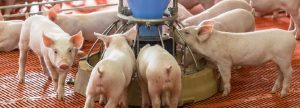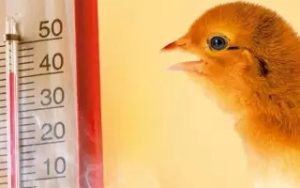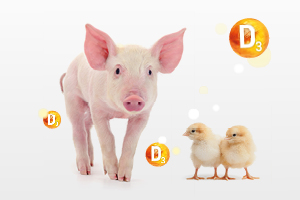19 Apr 2024
Vitamins, the essential micronutrients pivotal in livestock nutrition, are undergoing a renaissance in modern agricultural practices.
Evolving Standards: Periodic Updates Ensure Modern Adequacy
In the dynamic landscape of swine and poultry farming, where advancements in genetics and production techniques continually push the boundaries of productivity, the significance of proper nutrition cannot be overstated. Vitamins, often regarded as micronutrients, play a pivotal role in ensuring the optimal health, growth, and welfare of livestock. However, as the industry evolves, so too must our understanding of vitamin requirements and their applications.
Genetic Advancements: Optimization Essential for Modern Pigs


Traditionally, vitamin recommendations for swine and poultry have been established based on studies conducted several decades ago. However, with the advent of modern genetics and intensified production practices, questions arise about the adequacy of these recommendations for contemporary livestock genetics. The evolving nature of the industry, coupled with the complexity of commercial interests, underscores the necessity for periodic reviews and updates of vitamin recommendations.

Beyond Growth: Vitamins Vital for Welfare and Resilience
One of the primary drivers for reevaluating vitamin recommendations is the continual genetic improvement aimed at enhancing productivity and feed efficiency in swine. Genetic advancements have led to changes in pigs’ voluntary feed intake, particularly during critical phases such as weaning and early lactation. As productivity levels approach physiological limits, the optimization of nutrient supply becomes imperative to sustain growth and performance.
Combatting Stress: Crucial Allies in Environmental Challenges
Moreover, with a growing emphasis on animal welfare, consumer preferences, and environmental sustainability, the role of vitamins extends beyond mere growth optimization. Vitamins influence various physiological and metabolic processes critical for immune response, disease resistance, reproductive performance, and overall well-being. In an era where consumers are increasingly discerning about the quality and sustainability of animal products, ensuring optimum vitamin nutrition is paramount.
Gut Health Focus: Precision Nutrition for Enhanced Performance
Environmental stressors pose significant challenges in modern livestock production, affecting animal health, welfare, and performance. Heat stress, in particular, can have detrimental effects on poultry, leading to reduced feed consumption, impaired nutrient digestibility, and compromised immune function. Vitamins, such as vitamin C and E, emerge as crucial allies in mitigating the adverse effects of heat stress, bolstering antioxidant defenses, and supporting immune function.
Poultry Farming: Tackling Heat Stress with Vitamin Solutions
 Furthermore, emerging research highlights the intricate relationship between vitamins and gut health, particularly during critical phases like weaning. Vitamins, including β-carotenes, lycopene, and vitamin D, exhibit promising effects in enhancing intestinal immunity, modulating gut microbial communities, and fortifying intestinal barrier functions. Recognizing the pivotal role of vitamins in gut health opens new avenues for precision nutrition strategies to optimize livestock performance and resilience.
Furthermore, emerging research highlights the intricate relationship between vitamins and gut health, particularly during critical phases like weaning. Vitamins, including β-carotenes, lycopene, and vitamin D, exhibit promising effects in enhancing intestinal immunity, modulating gut microbial communities, and fortifying intestinal barrier functions. Recognizing the pivotal role of vitamins in gut health opens new avenues for precision nutrition strategies to optimize livestock performance and resilience.
Consumer Demands: Sustainable Practices Drive Nutritional Innovation
In poultry farming, where heat stress poses a significant challenge, vitamins such as vitamin C and E play instrumental roles in mitigating its adverse effects. Vitamin C supplementation has been shown to enhance carcass characteristics, improve feed consumption, and alleviate the negative impacts of heat stress on growth performance. Similarly, vitamin E supplementation in broiler breeders not only enhances antioxidant capacity but also improves egg quality, hatchability, and chick viability, thus ensuring sustainable flock productivity.

Future Outlook: Holistic Approaches for Sustainable Livestock Nutrition
As our understanding of vitamin physiology and livestock nutrition continues to evolve, so too must our practices in swine and poultry farming. The integration of scientific advancements, consumer preferences, and environmental considerations necessitates a holistic approach to vitamin nutrition. By harnessing the potential of vitamins to address current challenges and unlock the full productivity of livestock, we pave the way for a sustainable and resilient future in animal agriculture.

